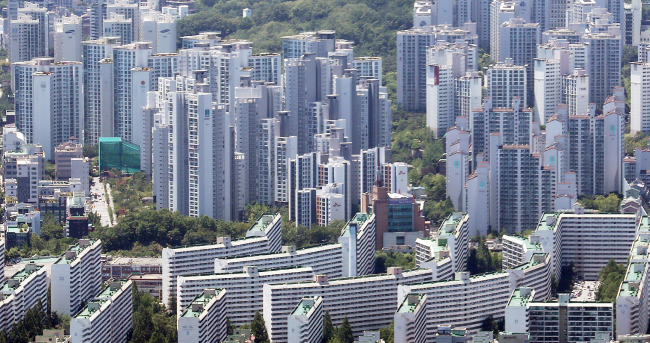Korea tightens lending rules to curb property speculation
By Julie Kim JacksonPublished : June 19, 2017 - 16:13
The government said Monday it would apply stricter lending regulations on homes in Seoul and parts of Busan to curb real estate speculation and reduce household debt.
The announcement was made jointly by the Ministry of Strategy and Finance, the Financial Services Commission and the Ministry of Construction and Transportation.
The new regulations, which are set to take effect on July 3, stipulates that the loan-to-value ratio in Seoul, Gyeonggi Province, Sejong and selected areas in Busan are to be lowered by 10 percent, from 70 to 60 percent. The debt-to-income ratio in the areas is also set to be lowered by 10 percent from 60 to 50 percent.
The announcement was made jointly by the Ministry of Strategy and Finance, the Financial Services Commission and the Ministry of Construction and Transportation.
The new regulations, which are set to take effect on July 3, stipulates that the loan-to-value ratio in Seoul, Gyeonggi Province, Sejong and selected areas in Busan are to be lowered by 10 percent, from 70 to 60 percent. The debt-to-income ratio in the areas is also set to be lowered by 10 percent from 60 to 50 percent.

The government will also set a limit on the resale of newly built homes throughout the capital in order to further restrain property speculation, as Seoul’s property market has been overheating.
The Moon Jae-in administration’s policies come amid turbulent times in the country’s housing market, with Korea’s snowballing household debt reaching a record 1,359.7 trillion won ($1.2 trillion) at the end of March.
In 2014, the Park Geun-hye administration raised the cap ratios of debt-to-income and loan-to-value by 10 percent from 60 percent and 70 percent, respectively, allowing homebuyers to easily obtain loans. However, the deregulation tactics are now widely blamed for the continued spike in household debt and real estate speculation.
If the property market continues to overheat following the reduced LTV and DTI ratios caps, the government added that it may establish additional measures until the market shows signs of cooling.
There has been a call for renewed lending policies, as the housing market shows continued signs of spiking prices. Housing prices in Seoul have risen for 17 consecutive weeks.
According to data from Statistics Korea on Sunday, Korea’s apartment prices grew roughly three times faster than the current average household income. It would take nearly 12 years for an average Korean household to pay off the cost of an apartment in Seoul, using its entire income.
The average current monthly household income rose by 8.7 percent, from 3.93 million won at the end of 2012 to 4.27 million won at the end of last year. However, according to data from Kookmin Bank, the average price of apartments nationwide surged 22 percent, from 260.8 million won in December 2012 to 318 million won in December 2016, marking an increase 2.6 times faster than the increase in average income.
In particular, Korea’s high-end districts such as Gangnam-gu and Seocho-gu led price hikes, with real estate assets surging an average of 0.22 and 0.23 percent, respectively, in the two areas.
Following the government’s announcement Monday, experts appeared confident that the housing market would turn around in the near future, despite real estate experts referring to the new LTV and DTI policies as “weak.” According to news reports, industry insiders view the government’s move as a sign that the heated housing market will begin to subside.
By Julie Jackson (juliejackson@heraldcorp.com)


















![[Today’s K-pop] Treasure to publish magazine for debut anniversary](http://res.heraldm.com/phpwas/restmb_idxmake.php?idx=642&simg=/content/image/2024/07/26/20240726050551_0.jpg&u=)